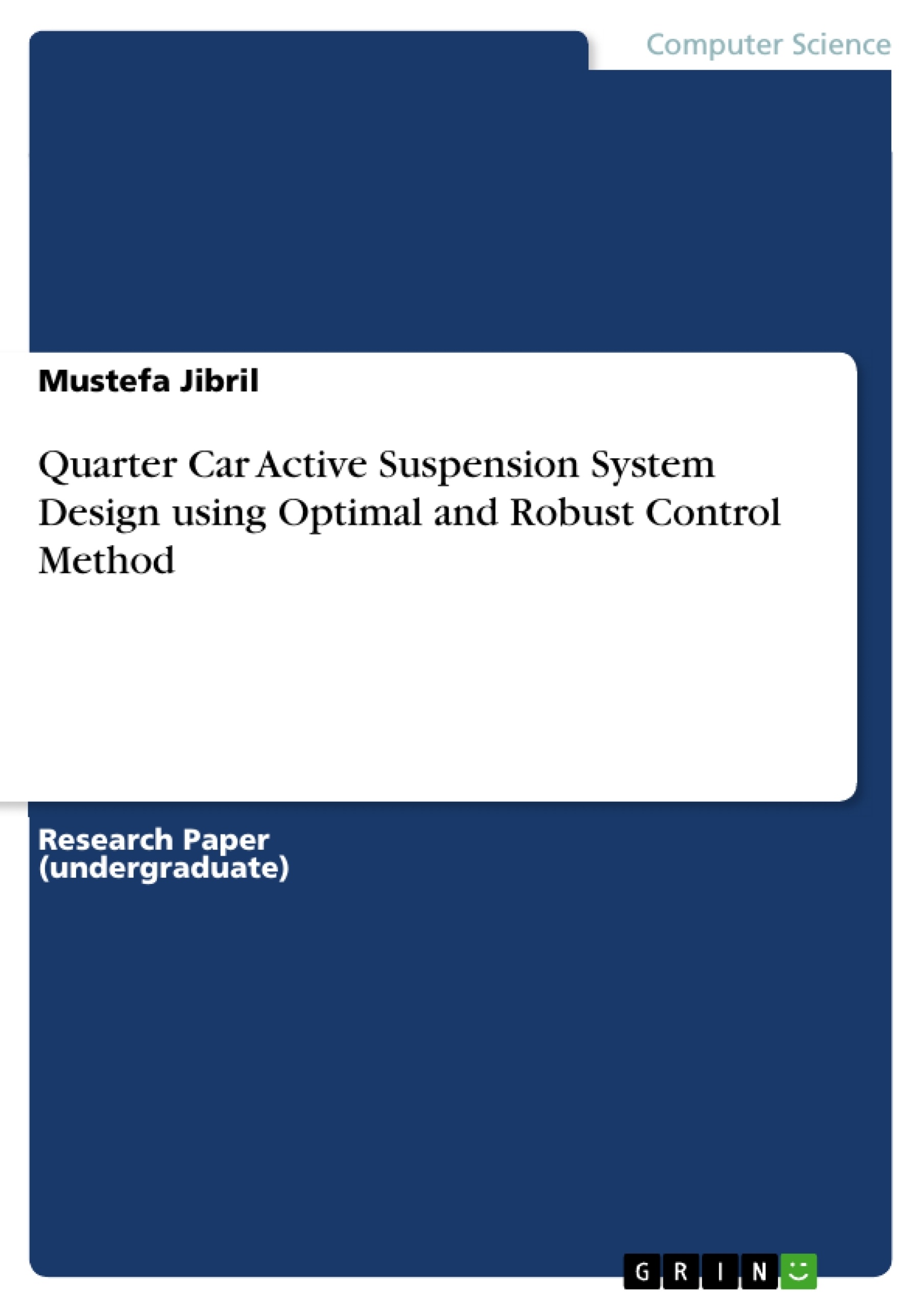This paper offers with the theoretical and computational evaluation of optimal & robust control problems, with the goal of providing answers to them with MATLAB simulation. For the robust control, μ-synthesis controller and for the optimal control, LQR controller are designed for a quarter car active suspension system to maximize the ride comfort and road handling criteria’s of the vehicle. The proposed controllers are designed using Matlab script program using time domain analysis for the four road disturbances (bump, random sine pavement and white noise) for the control targets suspension deflection, body acceleration and body travel. Finally the simulation result prove the effectiveness of the active suspension system with μ-synthesis controller.
Inhaltsverzeichnis (Table of Contents)
- I. INTRODUCTION
- II. MATHEMATICAL MODEL
- A. Quarter Vehicle Active Suspension System Mathematical Model
- III. Road Disturbance Input Signals
- A. Bump Road Disturbance
- B. Random Road Disturbance
- C. Sine Pavement Road Disturbance
- D. White Noise Road Disturbance
- IV. THE PROPOSED µ-SYNTHESIS CONTROL DESIGN
- A. µ-Synthesis Controller Design
- B. LQR Controller
- V. RESULT AND DISCUSSION
- A. Comparison of the active suspension system with µ−synthesis and LQR controllers
- I. Conclusion
Zielsetzung und Themenschwerpunkte (Objectives and Key Themes)
This paper delves into the theoretical and computational aspects of optimal and robust control techniques for active suspension systems, analyzing their performance in maximizing ride comfort and road handling capabilities. The objective is to address these control problems using MATLAB simulations and compare the effectiveness of µ-synthesis and LQR controllers.
- Design and analysis of active suspension systems for vehicle comfort and handling.
- Application of optimal control techniques (LQR) and robust control methods (µ-synthesis).
- Simulation and evaluation of controller performance under various road disturbances.
- Comparison of the effectiveness of µ-synthesis and LQR controllers for active suspension systems.
- Contributions of active suspension systems to improving ride comfort and road handling characteristics.
Zusammenfassung der Kapitel (Chapter Summaries)
- I. Introduction: This chapter introduces the concept of active suspension systems and their importance in addressing the conflicting demands of ride comfort and road handling. The limitations of passive suspension design and the advantages of active systems are highlighted, along with the increasing application of optimal control in various fields.
- II. Mathematical Model: This section details the mathematical model of a quarter-car active suspension system, including the equations of motion and the parameters involved. This model serves as the foundation for the control design and simulation.
- III. Road Disturbance Input Signals: This chapter presents four types of road disturbances that are used to simulate various real-world driving conditions: bump, random, sine pavement, and white noise. Each disturbance is described, and its relevance to testing the suspension system's performance is explained.
- IV. The Proposed µ-Synthesis Control Design: This section focuses on the design and implementation of the µ-synthesis controller. The chapter details the hydraulic actuator dynamics and the uncertainty model used to account for discrepancies between the real actuator and the model. It also covers the LQR controller, outlining its effectiveness in addressing some of the limitations faced by traditional PID controllers.
- V. Result and Discussion: This chapter presents and discusses the simulation results obtained for both µ-synthesis and LQR controllers, comparing their performance under the four road disturbances. The simulation results demonstrate the impact of each controller on suspension deflection, body acceleration, and body travel, highlighting the effectiveness of active suspension systems in improving overall vehicle performance.
Schlüsselwörter (Keywords)
This research focuses on quarter-car active suspension systems, utilizing optimal control methods like Linear Quadratic Regulator (LQR) and robust control techniques like µ-synthesis. The paper explores the effectiveness of these control strategies in improving vehicle ride comfort and handling by minimizing suspension deflection, body acceleration, and body travel under various road disturbances.
Frequently Asked Questions
What is a quarter car active suspension system?
It is a mathematical and engineering model used to design suspension systems that actively control vertical movement to improve ride comfort and road handling.
What is the difference between LQR and µ-synthesis control?
LQR (Linear Quadratic Regulator) is an optimal control method, while µ-synthesis is a robust control method designed to handle system uncertainties and disturbances more effectively.
Which road disturbances were used in the simulation?
The study tested the controllers against four types of disturbances: bump, random, sine pavement, and white noise.
How does an active suspension improve ride comfort?
By minimizing body acceleration and suspension deflection using actuators, the system isolates the vehicle body from road irregularities.
What software was used for the controller design?
The controllers and simulations were designed and executed using MATLAB script programming.
- Citar trabajo
- Mustefa Jibril (Autor), 2020, Quarter Car Active Suspension System Design using Optimal and Robust Control Method, Múnich, GRIN Verlag, https://www.grin.com/document/542101



